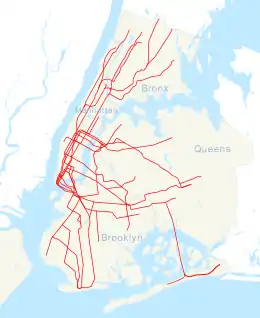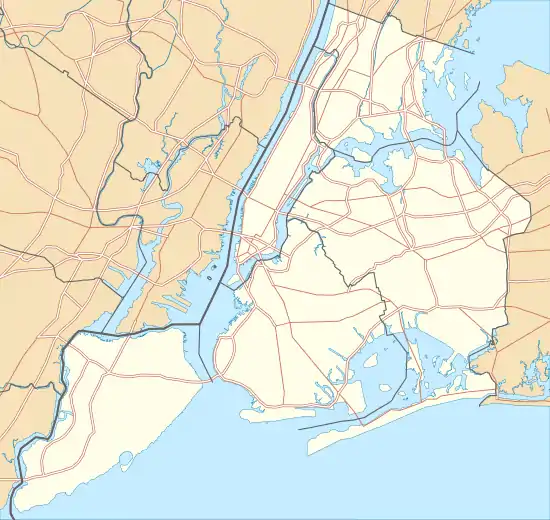Sumner Avenue station (BMT Myrtle Avenue Line)
The Sumner Avenue station was a station on the demolished section of the BMT Myrtle Avenue Line. The station was located at the intersection of Myrtle Avenue and Sumner Avenues (now Marcus Garvey Boulevard) in Bedford-Stuyvesant, Brooklyn. The station opened in 1889, and closed in 1969.
Sumner Avenue | |||||||||||||||||||||||||||||||
|---|---|---|---|---|---|---|---|---|---|---|---|---|---|---|---|---|---|---|---|---|---|---|---|---|---|---|---|---|---|---|---|
| Former New York City Subway station | |||||||||||||||||||||||||||||||
| Station statistics | |||||||||||||||||||||||||||||||
| Address | Myrtle Avenue & Sumner Avenue (Marcus Garvey Boulevard) Brooklyn, NY 11206 | ||||||||||||||||||||||||||||||
| Borough | Brooklyn | ||||||||||||||||||||||||||||||
| Locale | Bedford-Stuyvesant | ||||||||||||||||||||||||||||||
| Coordinates | 40.696366°N 73.940686°W | ||||||||||||||||||||||||||||||
| Division | B (BMT)[1] | ||||||||||||||||||||||||||||||
| Services | BMT Myrtle Avenue Line | ||||||||||||||||||||||||||||||
| Structure | Elevated | ||||||||||||||||||||||||||||||
| Platforms | 1 island platform | ||||||||||||||||||||||||||||||
| Tracks | 2 | ||||||||||||||||||||||||||||||
| Other information | |||||||||||||||||||||||||||||||
| Opened | April 27, 1889 | ||||||||||||||||||||||||||||||
| Closed | October 4, 1969 | ||||||||||||||||||||||||||||||
| Station succession | |||||||||||||||||||||||||||||||
| Next west | Tompkins Avenue | ||||||||||||||||||||||||||||||
| Next east | Broadway | ||||||||||||||||||||||||||||||
| |||||||||||||||||||||||||||||||
| |||||||||||||||||||||||||||||||
| |||||||||||||||||||||||||||||||
History
The Myrtle Avenue Elevated was constructed by the Union Elevated Railroad Company, which was leased to the Brooklyn Elevated Railroad for its operation. The initial section of the line opened on April 10, 1888, running over Myrtle Avenue from Johnson and Adams Streets to a junction with what was then known as the Main Line at Grand Avenue.[2][3] Trains continued along Grand Avenue and Lexington Avenue to Broadway, where the line joined the Broadway Elevated, and then along Broadway to East New York. On April 27, 1889, the line was extended east along Myrtle Avenue to Broadway, including a station at Sumner Avenue.[2][3][4][5]
On October 4, 1969, the section of the Myrtle Avenue Elevated between Broadway and Jay Street, including Sumner Avenue station, was closed and was demolished soon after.[6]
Station layout
This elevated station had two tracks and one island platform. The station's platform was wooden.[7]
References
- "Glossary". Second Avenue Subway Supplemental Draft Environmental Impact Statement (SDEIS) (PDF). Vol. 1. Metropolitan Transportation Authority. March 4, 2003. pp. 1–2. Archived from the original (PDF) on February 26, 2021. Retrieved January 1, 2021.
- Report. January 1, 1890.
- Roess, Roger P.; Sansone, Gene (August 23, 2012). The Wheels That Drove New York: A History of the New York City Transit System. Springer Science & Business Media. ISBN 9783642304842.
- "Will Open on Saturday". Brooklyn Daily Eagle. Brooklyn, NY. April 25, 1889. p. 1.
- "The Upper Myrtle Avenue Elevated". The Brooklyn Times Union. April 24, 1889. p. 1.
- "1,200 on Last Trip On Myrtle Ave. El; Cars Are Stripped". The New York Times. October 4, 1969. ISSN 0362-4331. Retrieved June 5, 2016.
- Testagrose, Joe (September 20, 1969). "Station platform in 1969". nycsubway.org.
External links
- "Sumner Avenue (BMT Myrtle)". nycsubway.org. Retrieved January 25, 2009.
- "BMT Myrtle Avenue Line". nycsubway.org. Retrieved January 25, 2009.
- "Myrtle Avenue El". Station Reporter. Archived from the original on June 9, 2011. Retrieved January 25, 2009.


